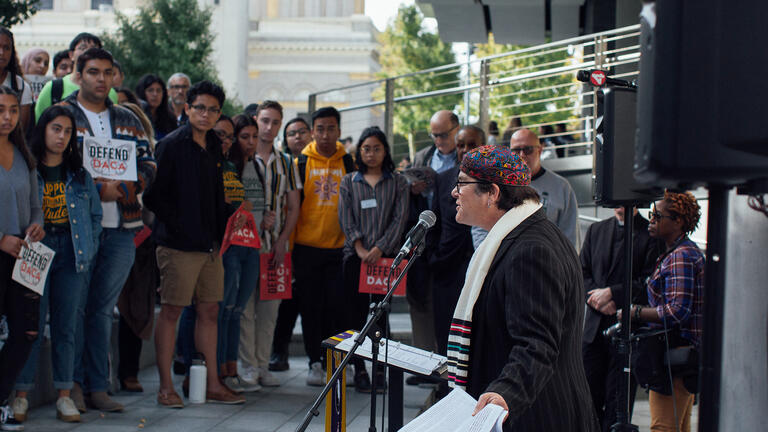
Graduate Level Certificate in Jewish Studies and Social Justice
Justice, Equity, Diversity, and Inclusion
+
Jewish Studies and Social Justice
Flexible. Virtual and in-person. At your own pace. As little as 12 months.
This certificate is the country’s only graduate-level program focused on Jewish studies and social justice (JSSJ) systemically infused with JEDI (Justice, Equity, Diversity, and Inclusion) values, developed to train professionals to work within, between, and beyond Jewish-identified communities.
The Graduate Level Certificate in Jewish Studies and Social Justice lives at the intersection of activism and empathy through a Jewish lens. It’s an educational movement that centers on anti-oppression, social justice, and human rights, focused on defining a path to a more just and inclusive world.
Areas of Focus
- Race
- Comparative Conflict Analysis
- Disability
- Environment
- Gender
- Genocide Studies
- Human Rights
- Indigeneity
- Queer and Trans Studies
- & more
Details
- Applications are currently being accepted on a rolling basis.
- Begin at any time! Sample one or two courses without a full certificate commitment.
- BIPOC + Queer/Trans scholarships available. (limited availability)
- Inquire for more details!
Fall 2025 Course
Arab Jews: Histories, Politics, and Identity with Hadar Cohen
Sundays 10am-1pm PST (remote synchronous)
August 24 | September 7, 21 | October 5, 19 | November 2, 16 | December 7
Join this course to explore the complex and vital identity of Arab Jews and what it means to understand them as an integral part of the broader Jewish world. We will delve into their rich cultural traditions, art, and religious practices while examining the political forces that have shaped their experiences, including Zionism, colonialism, and Arab nationalism.
Through this study, we will challenge the Ashkenormative frameworks that erase Arab Jewish identities. We will address the significance of terms like Sephardi and Mizrahi in understanding these communities, and examine the role of Arab Jews in shaping Jewish culture and politics. We will also explore how their history continues to influence the present and how their unique contributions have been celebrated and suppressed within the larger Jewish and Arab worlds.
This course will critically engage with the political erasure of Arab Jews, exploring how their displacement, cultural assimilation, and marginalization have been intertwined with the politics of Zionism, colonialism, and broader societal dynamics. Ultimately, we will consider what it means to move beyond these labels to pursue a more inclusive, diverse, and just Jewish world.
This course aims to help students deepen their capacity to create cultures of accessibility within Jewish social justice practice. We’ll bring classical Jewish texts into conversation with the lived experiences of contemporary disability activists to grapple with spiritual and political questions about access and equity, invisibility and shame, as well as practices for transforming social inequality. We’ll hone skills for recognizing and resisting ableism, as well as for understanding the way ableism intersects with racism, antisemitism, misogyny, queer, trans, fat hatred, and more. We’ll also examine the contours of hegemonic norms around decorum and behavior, pace and time, and physical and sensory access—and consider ways to transform our religious communities and cultural spaces so that they more fully welcome the vivid, complex diversity of all our bodies and minds.